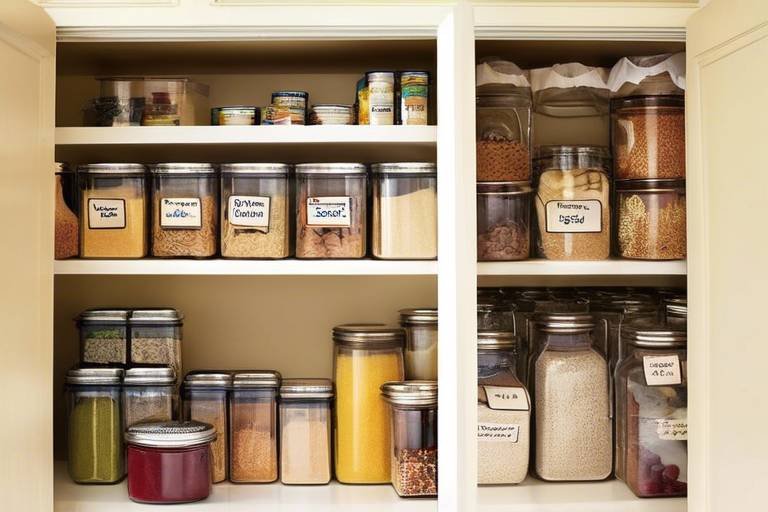Teaching Kids Lifeskills through Daily Chores
Engaging children in daily chores is more than just a way to keep the house tidy; it's a powerful tool for teaching essential lifeskills. When kids participate in household tasks, they not only learn how to contribute to the family but also develop a sense of responsibility and independence. Imagine a world where your child grows up knowing how to cook a meal, do their laundry, and manage their time effectively—these are the skills that chores can help instill. As parents, we often find ourselves caught up in the hustle and bustle of daily life, but by incorporating chores into our routines, we can create opportunities for learning and bonding with our children.
Chores can serve as a practical classroom where kids can experiment, make mistakes, and learn from them. Think of it like a mini-laboratory for real-life skills! When children learn to tackle tasks around the house, they gain confidence in their abilities, which translates into other areas of their lives. Whether it's learning to set the table or organizing their toys, each chore is a stepping stone toward greater competence and self-sufficiency.
Moreover, involving children in daily chores strengthens family bonds. When everyone pitches in, it fosters a sense of teamwork and belonging. It’s not just about getting the job done; it’s about sharing the experience. Families can turn chores into fun activities—think of it as a bonding exercise! Whether it’s cooking dinner together or cleaning up after a family game night, these moments create lasting memories and teach children the value of collaboration.
As we explore this topic, it's essential to recognize that the benefits of chores extend beyond just the tasks themselves. They lay the foundation for future success, teaching kids how to manage their time, prioritize tasks, and work toward achieving goals. In a world that often emphasizes individual achievement, chores remind us that success is often a team effort. So, let’s dive deeper into how we can effectively teach our kids these invaluable lifeskills through daily chores!

The Importance of Lifeskills
Understanding the significance of lifeskills is crucial for children's development. These skills are not just buzzwords; they are the essential tools that children need to navigate the complexities of life. Think of lifeskills as the building blocks of independence, enabling kids to tackle daily challenges with confidence. From managing their time effectively to understanding the importance of teamwork, lifeskills equip children to face the world head-on.
When children engage in chores, they are not merely completing tasks; they are learning valuable lessons that will serve them throughout their lives. For instance, when a child learns to cook a simple meal, they are not just following a recipe; they are gaining insights into nutrition, planning, and even budgeting. This kind of practical knowledge is invaluable, as it fosters a sense of responsibility and self-reliance.
Moreover, lifeskills contribute to a child's emotional and social development. Skills such as communication, problem-solving, and conflict resolution are critical in helping children build relationships. As they work alongside family members during chores, they learn to express themselves, negotiate roles, and collaborate effectively. This not only strengthens family bonds but also prepares them for future interactions in school and beyond.
To illustrate the importance of lifeskills, consider the following table that highlights some key skills and their benefits:
| Lifeskill | Benefit |
|---|---|
| Time Management | Helps children prioritize tasks and meet deadlines. |
| Teamwork | Encourages collaboration and builds social skills. |
| Problem Solving | Enhances critical thinking and decision-making abilities. |
| Self-Care | Promotes independence and personal responsibility. |
In summary, the importance of lifeskills cannot be overstated. They form the foundation upon which children can build their futures. By engaging in daily chores, children not only learn practical skills but also develop the confidence and resilience necessary to navigate the ups and downs of life. So, the next time your child is reluctant to help out, remember that they are not just doing chores; they are cultivating their future!

Choosing Age-Appropriate Chores
Choosing the right chores for your child can be a game-changer in their development journey. It’s not just about getting things done around the house; it’s about giving them the opportunity to learn and grow. When you select age-appropriate tasks, you’re setting the stage for your child to feel a sense of accomplishment and to recognize their contributions to the family. Think of it as planting seeds of responsibility that will flourish as they grow.
For instance, toddlers are just beginning to explore their environment and understand the concept of responsibility. Simple tasks such as picking up toys or sorting laundry can be incredibly beneficial. Not only do these activities help develop their motor skills, but they also introduce the idea of teamwork and community within the family. You might be surprised at how much joy a toddler can find in organizing their toys or helping with laundry!
As children transition into the school-aged phase, their capabilities expand significantly. They can handle more complex chores such as making their beds, helping with meal prep, or even setting the table. These tasks not only enhance their problem-solving skills but also foster a sense of independence. When they successfully complete a chore, it’s like they’ve climbed a mini-mountain of achievement. It’s essential to match the task to their skill level, ensuring they feel challenged yet capable.
To give you a clearer picture of age-appropriate chores, here’s a simple table outlining some examples:
| Age Group | Chores |
|---|---|
| Toddlers (1-3 years) |
|
| Preschoolers (4-5 years) |
|
| School-Aged Kids (6-12 years) |
|
By thoughtfully choosing chores that align with your child’s age and developmental stage, you not only help them build essential life skills but also create a nurturing environment where they can thrive. The key is to make it fun and engaging, so they look forward to these responsibilities rather than viewing them as chores. After all, who wouldn’t want to feel like a superhero for helping out at home?

Chores for Toddlers
When it comes to involving toddlers in chores, the key is to keep things simple and fun. At this age, children are naturally curious and eager to imitate adult behaviors. By engaging them in basic tasks, we not only introduce them to the concept of responsibility but also help develop their fine motor skills. Simple chores like picking up toys, sorting laundry, or even putting away books can be both enjoyable and educational. These activities might seem trivial to us, but for toddlers, they are monumental steps towards independence.
Moreover, these early chores can serve as a wonderful opportunity for bonding. Imagine your little one beaming with pride as they successfully place their toys in a designated box! This sense of accomplishment is crucial at such a tender age, as it fosters a feeling of belonging and teamwork within the family. It's like planting seeds of responsibility that will grow into a strong tree of independence as they mature.
Another important aspect of engaging toddlers in chores is establishing a consistent routine. Children thrive on predictability, and having a set time for chores can help them understand what is expected of them. For instance, you might create a simple chart that outlines daily tasks, such as:
| Day | Chore |
|---|---|
| Monday | Pick up toys after playtime |
| Tuesday | Help sort laundry by color |
| Wednesday | Put away books after reading |
| Thursday | Help set the table for meals |
| Friday | Water plants with supervision |
By following this structured approach, toddlers can develop a sense of routine that makes chores feel like a natural part of their day rather than a chore they must endure. It's like teaching them a dance where each step has its rhythm, and soon enough, they’ll be twirling around the house with joy!
In conclusion, involving toddlers in chores not only aids their development but also strengthens family bonds. It’s about creating a nurturing environment where they can learn and grow while having fun. So, why not start today? The sooner they begin, the more equipped they will be for the future!

Benefits of Early Engagement
This article explores how engaging children in daily chores can foster essential life skills, instill responsibility, and promote independence, while also enhancing family bonds and creating a sense of accomplishment.
Understanding the significance of lifeskills is crucial for children's development. These skills contribute to their ability to navigate daily challenges and build confidence in their capabilities.
Selecting the right chores based on a child's age ensures they can participate meaningfully. Age-appropriate tasks help children feel accomplished and encourage their willingness to contribute.
Toddlers can engage in simple tasks like picking up toys or sorting laundry. These activities promote motor skills and introduce the concept of responsibility in a fun way.
Introducing chores at an early age fosters a sense of belonging and teamwork within the family, laying a foundation for future responsibility and independence. When toddlers are involved in household tasks, they begin to understand the importance of contributing to the family unit. This early engagement not only helps them develop essential skills but also instills a sense of pride in their accomplishments.
Moreover, when children participate in chores, they learn about the value of teamwork. For instance, when they help with simple tasks like setting the table or sorting laundry, they see how their efforts contribute to the household's smooth operation. This collaborative spirit can create a strong bond among family members, making chores feel less like a burden and more like a shared adventure.
Early engagement in chores also promotes a sense of independence. As toddlers learn to complete tasks on their own, they gain confidence in their abilities. This newfound independence can translate to other areas of their lives, such as school and friendships. They begin to see themselves as capable individuals, ready to tackle challenges head-on.
A few key benefits of early engagement in chores include:
- Skill Development: Children learn motor skills and problem-solving abilities.
- Sense of Accomplishment: Completing tasks gives them a boost of confidence.
- Teamwork: They understand the importance of working together.
- Independence: They learn to take initiative and responsibility.
By incorporating chores into their daily routine, parents can help children develop a strong foundation for the future. It's not just about keeping the house clean; it's about building character and fostering a sense of community within the family.
Establishing a routine for toddlers helps them understand expectations and develop consistency, making chores a natural part of their daily lives.
School-aged children can take on more complex tasks such as making their beds or helping with meal prep. These chores enhance their problem-solving skills and promote teamwork.
Encouraging a positive attitude towards chores is essential for children to embrace responsibility. Using praise and rewards can motivate them to participate willingly.
Making chores enjoyable through games or challenges can transform mundane tasks into engaging activities, fostering a sense of enthusiasm and cooperation among siblings.
Establishing goals for completing chores can motivate children. Implementing a reward system reinforces positive behavior and encourages them to take ownership of their responsibilities.
- At what age should I start assigning chores to my child? It’s beneficial to start with simple tasks as early as toddlers can understand and follow instructions.
- How can I make chores more enjoyable for my kids? Incorporate games or challenges, and offer rewards for completing tasks to keep them engaged.
- What if my child resists doing chores? Encourage a positive attitude by praising their efforts and explaining the importance of teamwork.
- Are there specific chores that are better suited for different ages? Yes, tailoring tasks to a child's developmental stage enhances their ability to contribute meaningfully.

Creating a Routine
Establishing a routine for toddlers is not just about assigning chores; it’s about creating a structured environment where they can thrive. When kids know what to expect, they feel more secure and confident in their abilities. Imagine waking up every morning to a predictable schedule—it’s like having a roadmap for the day! This predictability helps children understand their roles within the family and makes chores feel less like a burden and more like a natural part of life.
To create an effective routine, start by incorporating chores that are simple and manageable for toddlers. For instance, you might designate specific times of the day for certain tasks. Here’s a sample routine:
| Time | Activity |
|---|---|
| 8:00 AM | Pick up toys after breakfast |
| 10:00 AM | Help sort laundry by colors |
| 12:00 PM | Assist in setting the table for lunch |
| 3:00 PM | Water indoor plants |
By establishing a consistent schedule, you not only help your child understand when chores will happen but also give them something to look forward to. It’s essential to be flexible, though. Some days may not go as planned, and that’s okay! The key is to maintain a balance between structure and adaptability.
Additionally, make it a point to involve your child in the process of creating this routine. Ask them what chores they would like to do and let them have a say in the timing. This involvement can make them feel more empowered and responsible. For example, if your toddler loves playing with their toys, you might agree that they will pick them up right after playtime. This not only fosters a sense of ownership but also teaches them that their contributions matter.
Lastly, don’t forget to celebrate their efforts! Acknowledge their hard work with praise or a small reward, reinforcing the idea that chores are not just tasks to be completed but opportunities for growth and learning. This positive reinforcement can turn routine chores into exciting challenges that children will look forward to tackling each day!

Chores for School-Aged Kids
As children reach school age, they become more capable of handling a variety of chores that not only teach them responsibility but also help them develop essential life skills. At this stage, kids can take on tasks that are a bit more complex, which can significantly boost their confidence and independence. Imagine your child making their bed each morning or helping you prepare dinner; these activities are not just chores, they are stepping stones towards self-sufficiency.
For school-aged kids, chores can range from simple to moderately challenging. Here are some examples of age-appropriate chores:
- Making their beds: This simple task teaches children the importance of a tidy environment and personal responsibility.
- Helping with meal prep: Involving kids in the kitchen can enhance their cooking skills and nutritional awareness.
- Sorting and folding laundry: This chore not only helps them learn about organization but also gives them a sense of accomplishment.
- Taking out the trash: This teaches them the importance of cleanliness and contributing to household upkeep.
Engaging in these chores allows children to experience the satisfaction of completing a task and seeing the immediate results of their efforts. It's like planting a seed and watching it grow; the more they care for it, the more it flourishes. Additionally, chores can be a fantastic opportunity for parents to bond with their children. Cooking dinner together or organizing their room can lead to meaningful conversations and shared experiences that strengthen family ties.
Moreover, these chores serve as practical lessons in time management and teamwork. When children participate in household activities, they learn to prioritize tasks and understand the value of working together. This not only prepares them for future responsibilities but also instills a sense of community within the family unit. As they grow older, these skills will translate into their academic and social lives, making them more adept at handling various situations.
In conclusion, involving school-aged kids in household chores is a win-win situation. It fosters independence, builds confidence, and enhances family relationships. The key is to keep the experience positive and rewarding. Encourage your child by recognizing their efforts and celebrating their achievements, no matter how small. After all, every little step they take in mastering these chores is a leap towards becoming capable and responsible adults.

Fostering a Positive Attitude
Encouraging a positive attitude towards chores is essential for children to embrace responsibility. It's not just about getting the job done; it’s about creating an environment where children feel excited to contribute. Think of it like planting a seed: if you nurture it with care and positivity, it will grow into something beautiful. When children associate chores with fun and accomplishment, they're more likely to take ownership of their responsibilities. So, how do we create this positive atmosphere?
One effective method is to use praise and rewards. Positive reinforcement can do wonders in motivating children. When they complete a chore, a simple “Great job!” or a high-five can make all the difference. It’s like giving them a little boost of confidence that says, “You can do this!” Over time, this encouragement builds their self-esteem and reinforces the idea that chores are not just tasks but opportunities for growth.
Moreover, incorporating fun elements into chores can transform them from mundane tasks into exciting challenges. For instance, you could turn cleaning into a game by setting a timer and seeing how many toys can be picked up before it goes off. Or, why not create a friendly competition among siblings? This not only makes chores more enjoyable but also fosters teamwork and camaraderie. When children work together, they learn valuable social skills while getting the job done.
Another strategy is to set clear goals and rewards. Kids love having something to strive for! You can establish a simple chart where they can track their completed chores. Once they reach a certain number of completed tasks, reward them with something special—perhaps a family movie night or a small treat. This tangible recognition reinforces their efforts and encourages them to continue participating actively. It’s a win-win situation!
Lastly, it’s crucial to model a positive attitude yourself. Children are like sponges; they absorb the behaviors and attitudes of those around them. If they see you tackling chores with enthusiasm and a smile, they’re more likely to mimic that behavior. Share your own experiences and even your struggles with chores, and let them know that it’s okay to find some tasks challenging. This openness creates a supportive environment where children feel safe to express their feelings about chores.
In summary, fostering a positive attitude towards chores involves a combination of praise, fun, goal-setting, and leading by example. By creating an engaging and supportive atmosphere, we can help our children view chores not as burdens, but as valuable life skills that contribute to their growth and independence. So, let’s roll up our sleeves and make chores a family adventure!
- How can I make chores more appealing for my child? Try incorporating games or challenges to make chores fun. Use timers, music, or friendly competitions to engage them.
- What age is appropriate to start giving chores? You can start with simple tasks as early as toddlers. As they grow, gradually increase the complexity of the chores.
- How do I handle resistance to chores? Address it with patience. Encourage open communication about their feelings and offer support to help them understand the importance of their contributions.

Incorporating Fun into Chores
Let’s face it, chores can sometimes feel like a drag, especially for kids. But what if I told you that you could turn these mundane tasks into a fun and engaging experience? Incorporating fun into chores is not just about making them more enjoyable; it’s about creating lasting memories and instilling a sense of teamwork among family members. Imagine transforming the simple act of cleaning into a lively game! By adding a sprinkle of creativity, you can elevate the chore experience from a dreaded obligation to an exciting adventure.
One effective way to make chores enjoyable is by introducing games. For instance, you could set a timer and challenge your kids to see how many toys they can pick up before the timer goes off. This not only adds a competitive edge but also turns cleaning into a race against the clock. You could even create a chore chart with colorful stickers that kids can place on their completed tasks, making them feel proud and accomplished. This visual reward system can be a game-changer, as it encourages children to participate actively.
Another fun approach is to incorporate music into chore time. Create a playlist of upbeat songs that everyone loves, and let the rhythm guide your cleaning session. Dancing while dusting or singing while sorting laundry can lighten the mood and make the chores feel less like work. You could even have a “dance break” where everyone shows off their best moves before diving back into the tasks at hand. This not only makes chores enjoyable but also strengthens family bonds as you share laughs and create joyful moments together.
Moreover, consider rotating chores among family members to keep things fresh. This way, no one feels stuck doing the same task week after week. You could also introduce themed chore days where everyone dresses up according to a fun theme. For example, have a “pirate day” where you all wear eye patches while cleaning, or a “superhero day” where everyone dons their favorite capes. These little twists can make chores feel like a special event rather than a chore, encouraging everyone to participate willingly.
Lastly, don’t underestimate the power of rewards. Establish a reward system that recognizes effort and completion of chores. This could range from earning points towards a family outing to a simple treat at the end of the week. By linking chores to positive outcomes, you instill a sense of ownership and responsibility in your children, while also making the experience enjoyable.
In summary, incorporating fun into chores is all about creativity and teamwork. By turning these tasks into games, adding music, rotating responsibilities, and implementing rewards, you can transform the way your family views chores. Instead of a dreaded obligation, they become a delightful part of family life, fostering responsibility while creating cherished memories. So, why not give it a try? You might just find that chore time becomes the highlight of your day!
- How can I motivate my child to do chores? Start by making chores fun and engaging. Use games, music, and rewards to create a positive environment.
- What age should I start giving my child chores? You can begin introducing simple chores as early as toddler age, gradually increasing their complexity as they grow.
- How can I ensure my child takes responsibility for their chores? Establish a routine, use a chore chart for tracking progress, and offer praise and rewards for completed tasks.
- What if my child refuses to do chores? Try to understand their reluctance and find ways to make chores more appealing. Discuss the importance of teamwork and responsibilities.

Setting Goals and Rewards
Setting goals and rewards can be a game changer when it comes to getting kids involved in chores. Imagine this: your child has a big smile on their face as they complete a task, and you can see that sparkle of accomplishment in their eyes. That’s the magic of goal-setting! When children have clear objectives to work towards, they’re not just doing chores; they’re embarking on a mini-adventure. It’s like giving them a treasure map where each completed task is a step closer to the prize!
To make this process even more effective, consider implementing a simple reward system. Rewards can be anything from stickers, extra screen time, or even a special treat. The key is to ensure that the rewards are enticing enough to motivate your little ones. For instance, you might create a chart where they can track their progress. Each time they complete a chore, they get to place a sticker on their chart. Once they collect a certain number of stickers, they can redeem them for a reward. This not only makes chores more engaging but also teaches them the value of hard work and delayed gratification.
Here’s a basic example of how you could structure a goal and reward system:
| Chore | Goal | Reward |
|---|---|---|
| Make Bed | 5 times a week | Extra 30 minutes of screen time |
| Help with Dinner | 3 times a week | Choose a family movie night |
| Clean Up Toys | Every day | Sticker for the chart |
By setting specific goals for each chore, children can see their achievements clearly, which can be incredibly motivating. It’s like leveling up in a video game—each chore completed is a step towards unlocking a new level of fun and rewards!
Additionally, it’s important to celebrate their successes, no matter how small. A simple “Great job!” or a high-five can go a long way in reinforcing positive behavior. Children thrive on recognition, and acknowledging their efforts helps build their self-esteem. Remember, the goal is not just to get the chores done but to instill a sense of pride and ownership in their responsibilities.
In conclusion, setting goals and rewards transforms the chore experience from a mundane task into an exciting challenge. It empowers children to take charge of their responsibilities while also reinforcing family values. So, grab that chart, get some stickers, and watch as your kids turn into little chore champions!
- What age should I start involving my child in chores? It's best to start as early as toddlers, introducing simple tasks that match their developmental stage.
- How do I handle resistance to chores? Try to make chores fun and engaging. Incorporate games or challenges to spark their interest.
- What if my child forgets to do their chores? Establish a routine and use reminders, such as a chore chart, to help them remember their responsibilities.
Frequently Asked Questions
- Why should I involve my kids in daily chores?
Involving your kids in daily chores helps them develop essential life skills like responsibility, teamwork, and independence. It's like giving them a mini training session for adulthood, helping them navigate challenges with confidence.
- What age is appropriate to start assigning chores?
You can start assigning simple chores to toddlers, such as picking up toys or sorting laundry. As they grow, you can gradually introduce more complex tasks. It's all about matching the chores to their developmental stage!
- How can I make chores fun for my children?
Try turning chores into games or friendly competitions! For example, set a timer and see who can clean their room the fastest. Adding an element of fun can make these tasks feel less like chores and more like exciting challenges.
- What are some effective rewards for completing chores?
Rewards can vary from stickers and extra playtime to a fun family outing. The key is to make sure the rewards are meaningful to your child, encouraging them to take ownership of their responsibilities.
- How can I encourage a positive attitude towards chores?
Use praise and positive reinforcement to motivate your kids. Celebrate their accomplishments, no matter how small, and encourage them to see chores as a way to contribute to the family. A little recognition goes a long way!
- What if my child resists doing chores?
If your child is resistant, try to understand their feelings. Sometimes, they may feel overwhelmed. Take a step back, simplify the tasks, and involve them in choosing their chores. This empowers them and can lead to a more willing attitude.
- How can I create a chore routine that sticks?
Consistency is key! Set a specific time for chores each day, and use visual schedules or charts to help your kids remember their responsibilities. Over time, this routine will become a natural part of their daily lives.



















